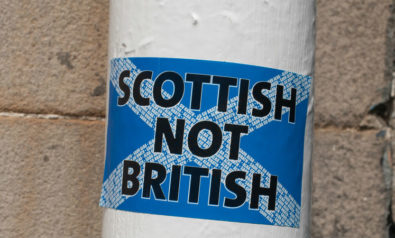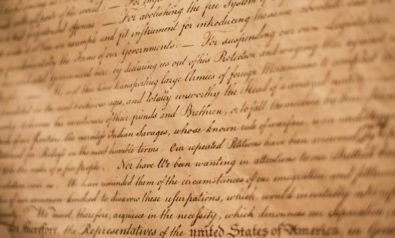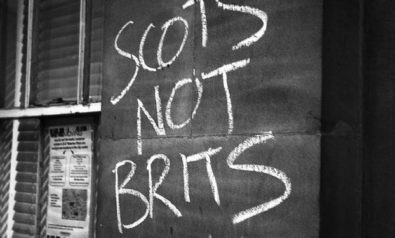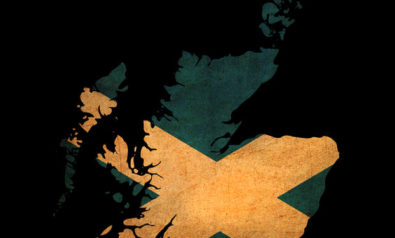The London establishment ought to be careful what it wishes for in Scotland.
“England would lose a surly lodger, and gain a good neighbour.” That’s the oft-repeated summary of Alex Salmond, Scotland’s first minister, on how the relationship between the two countries would be transformed for the better if Scotland chooses to become an independent country in the referendum on September 18. One thing that has become clear as polling day has approached, though, is that the London political, media and business establishment are determined to keep their surly lodger at all costs – including at the cost of making that lodger a good deal more surly than before. They should probably be more careful what they wish for.
A Mature Reaction?
What would have been the mature reaction on September 7, when the Westminster elite awoke to the news that the first opinion poll to put the Yes side in the lead had just been published? I don’t dispute their democratic right to continue arguing in the familiar old self-interested way that it’s a bad idea for Scotland to govern its own affairs, but I think cooler heads ought to have realized that there are good ways and bad ways of aiming for a No vote, and that if the good ways aren’t sufficient, then it isn’t worth being on the winning side at all.
Instead, they went berserk and threw the kitchen sink at Scotland. No tactic was too cynical – we were to be bullied, bribed and deceived into sticking with London rule. Astoundingly, even the BBC, renowned in many parts of the world as a beacon of impartiality, utterly lost its head at the most crucial moment, seemingly reacting reflexively on the basis of the word “British” in its name, as if that trumped any other consideration. For day after day, it breathlessly beamed the latest scare stories into Scottish homes, without ever applying any critical analysis to whether those stories had any credibility, or to the political agenda that lay behind them.
If there is a No vote, almost half of people will have voted Yes and will be angry that the state broadcaster deprived them of the level playing field on which the prize might have been won, while a sullen minority of “soft” No voters will swiftly realize that they were duped by the scare stories and false promises on their television screens.
Nor was there any serious attempt to provide balance by giving an equivalent airing to the ways in which the United Kingdom has stood indicted during the campaign – for appalling levels of inequality and child poverty, and for leaving parts of the city of Glasgow with lower male life expectancy figures than the Gaza Strip. These are, after all, among the reasons why the referendum is taking place in the first place. But no, the only thing the BBC think voters have any business basing their decision on is the latest fairy-tale from a fabulously wealthy banker about how the national independence of one country, uniquely among the countless small independent countries of Europe, will cause economic calamity.
Anti-Politics Protest Vote
And that’s before we even come to the astonishing ignorance of much of the coverage. Prior to the pandemonium-inducing opinion poll, the BBC’s Scottish branch in Glasgow were firmly in the driving seat, if only due to the total disinterest of their network colleagues. That meant experienced and knowledgeable journalists such as political editor Brian Taylor were able to shape the corporation’s referendum output in a way that didn’t just promote nominal tick-boxing “balance,” but instead helped viewers to appreciate the nuances of the two campaigns’ arguments. But as soon as those journalists had been abruptly muscled aside by their network “betters”, the quality and factual accuracy of the coverage plummeted.
For example, a bemused Scottish public were informed that they were only considering national independence as an “anti-politics protest vote,” roughly equivalent to the recent success of a Eurosceptic fringe party in England. More seriously, they were misled into thinking that London’s panicked, last minute, cobbled-together proposals for increasing the powers of the Scottish Parliament represented something called “Devo Max.” That term has a very specific meaning – the devolution of all powers to the Scottish Parliament apart from foreign affairs and defense. The actual proposals fall light-years short of that, and yet by applying the name “Devo Max” to them, BBC network journalists gave the London parties exactly what they wanted – the ability to make it sound like they were promising the Earth, while actually promising very little.
I wonder if there are people in the BBC who now privately realize that through their own actions, a situation has arisen in which only a Yes vote can avert a crisis for them. A public service broadcaster cannot function properly without the trust of the public. If there is a No vote, almost half of people will have voted Yes and will be angry that the state broadcaster deprived them of the level playing field on which the prize might have been won, while a sullen minority of “soft” No voters will swiftly realize that they were duped by the scare stories and false promises on their television screens. That’s the kind of perfect storm that could lead to a withdrawal of support similar to the one The Sun newspaper suffered in the Liverpool area after the Hillsborough tragedy.
Perhaps, on reflection, there might have been something to be said in favor of settling for having a good neighbor instead?
The views expressed in this article are the author’s own and do not necessarily reflect Fair Observer’s editorial policy.
Support Fair Observer
We rely on your support for our independence, diversity and quality.
For more than 10 years, Fair Observer has been free, fair and independent. No billionaire owns us, no advertisers control us. We are a reader-supported nonprofit. Unlike many other publications, we keep our content free for readers regardless of where they live or whether they can afford to pay. We have no paywalls and no ads.
In the post-truth era of fake news, echo chambers and filter bubbles, we publish a plurality of perspectives from around the world. Anyone can publish with us, but everyone goes through a rigorous editorial process. So, you get fact-checked, well-reasoned content instead of noise.
We publish 2,500+ voices from 90+ countries. We also conduct education and training programs
on subjects ranging from digital media and journalism to writing and critical thinking. This
doesn’t come cheap. Servers, editors, trainers and web developers cost
money.
Please consider supporting us on a regular basis as a recurring donor or a
sustaining member.
Will you support FO’s journalism?
We rely on your support for our independence, diversity and quality.













Comment